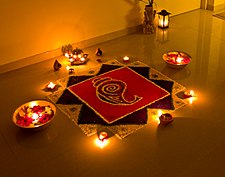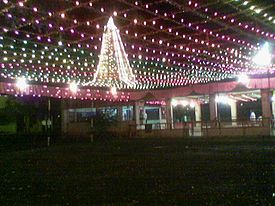DEWALI FESTIVAL
This festival is celebrated in the Hindu month of Kartika which falls sometime during October or November. It is celebrated to mark the return of Lord Rama from 14 years of Exile and his victory over the Demon Ravana. In many parts of India, Diwali is celebrated for five consecutive days and is one of the most popular festivals in India. Hindus regard it as a celebration of life and use the occasion to strengthen family and relationships. In some parts of India, it marks the beginning of the new year. It is celebrated not only in India but also abroad. The Hindus worship the Lord Ganesha and Goddess Laxmi during Diwali.
Firecrackers, which use sulphur and paper, put sulphur dioxide and charcoal into the air so crackers are now forbidden in silent zones i.e. near hospitals, schools and courts.
Hindus light up their homes and shops, to welcome the goddess of wealth and fortune, Goddess Lakshmi , to give them good luck for the year ahead. A few days before Ravtegh, which is the day before Diwali, houses, buildings, shops and temples are thoroughly cleaned, white-washed and decorated with pictures, toys and flowers. On the Diwali day, people put on rich clothes, exchanging greetings, gifts and sweets on this day.
At night, buildings are illuminated with earthen lamps, candle-sticks and electric bulbs. Sweets and toy shops are decorated to attract the passers-by. The bazaars and-streets are overcrowded. People buy sweets for their own families and also send them as presents to their friends and relatives. At night, Goddess Laxmi, the goddess of wealth, is worshiped in the form of earthen images and silver rupee. People believe that on this day, Hindu Goddess Laxmi enters only those houses which are neat and tidy. People offer prayers for their own health, wealth and prosperity. They leave the light on in buildings in their belief that Goddess Laxmi will find no difficulty in finding her way in.


Comments
Post a Comment